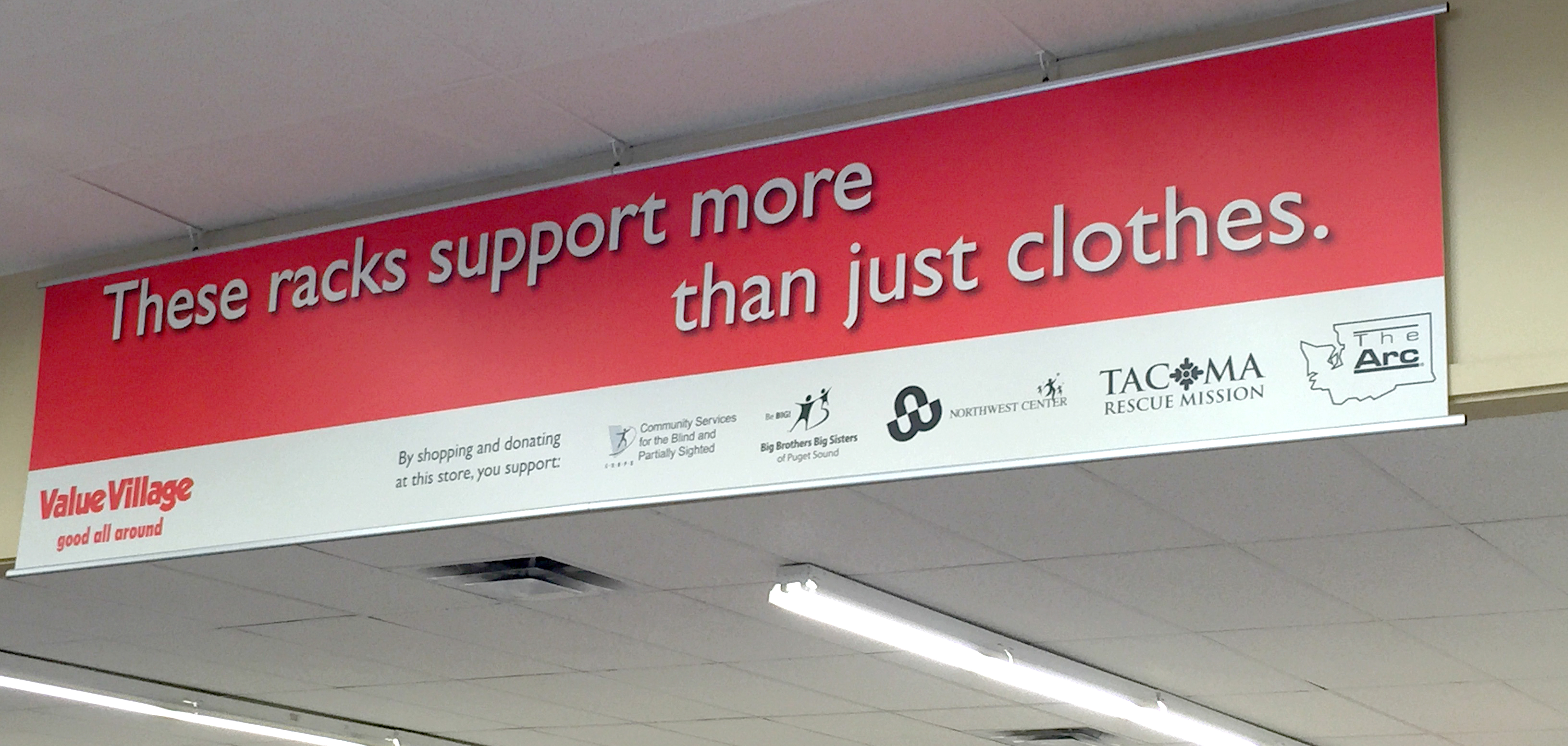Judge found Value Village’s advertising deceptively portrayed the company as a charity
SEATTLE — As a result of Attorney General Bob Ferguson’s consumer protection lawsuit, a King County Superior Court judge today ruled that from 2009 to today, for-profit Value Village deceived consumers into believing the company is a nonprofit or a charity and that purchases
 |
 |
| A King County Superior Court judge ruled that advertisements like these misled consumers that Value Village is a charity or nonprofit, and that purchases benefitted charities. |
benefited charities, when they do not. The judge ruled that Value Village knew or should have known its advertising was deceptive.
King County Superior Court Judge Roger Rogoff ruled that Value Village’s advertising misled consumers into thinking that it was a charity or nonprofit. In reality, Value Village is a for-profit business that brings in $1 billion in revenue annually. Importantly, Value Village knew that its advertising had the capacity to deceive consumers based on marketing studies that it commissioned and testimony from its former chief executive officer.
Judge Rogoff also found that Value Village misled Washingtonians that their purchases benefit charities. In fact, no portion of any purchases in any store owned by Value Village’s parent company, TVI Inc., has ever benefitted charities.
Today’s ruling only addresses whether Value Village broke the law. Judge Rogoff will determine the amount of penalties Value Village will face for doing so at a separate hearing, expected sometime next spring.
“Value Village profited by misleading Washingtonians into believing that it was a nonprofit,” Ferguson said. “My office received numerous complaints from consumers who feel deceived by Value Village’s advertising.”
Judge Rogoff also found Value Village deceived consumers in the Spokane area when it advertised that donations would benefit the Rypien Foundation. The company paid Rypien a flat fee per month for the use of the foundation’s name and logo. However, Rypien was not paid for all donations.
Much of Value Village’s advertising gave Washington consumers the impression that it was a nonprofit organization. For example, advertisements in store and online claimed Washingtonians shopping or donating at the stores would “help your neighbors,” constitute “good deeds” and support Value Village’s “philanthropic efforts” in developing nations.
Value Village’s advertising claimed in-store purchases benefited its charitable partners. For example, one of the company’s in-store advertisements said, “Your donations and purchases help us fund [nonprofits'] programs and services. How’s that for shopping with a smile?” No portion of Value Village in-store sales benefited its charity partners.
Judge Rogoff read his ruling at a hearing Friday morning. The written order is expected to follow sometime next week. The state did not prevail on every claim.
Ferguson filed a lawsuit in December 2017 against Bellevue-based TVI Inc., the company that owns Value Village. The lawsuit alleged that the company has deceived thousands of Washington consumers and donors for more than a decade with an aggressive marketing campaign.
TVI is the largest for-profit thrift retailer in the world, generating more than $1 billion in annual revenue. It runs 330 stores worldwide and 20 Value Village stores in Washington state.
Prior to the lawsuit, multiple consumers shared their frustration over Value Village’s practices in complaints to the Attorney General’s Office.
A Lacey resident wrote:
“The impression any donor or customer receives is that Value Village (Savers) is a non-profit giving most of their profits to xyz charities. However, not a single store or shift manager in Thurston, Pierce, or King County (I went to many just to ask the question, as I couldn't find any data on-line) could tell me the actual percentage of income or profit or anything about what they actually give to a charity….I have no affiliation with any of these stores except as a shopper. However, I believe when the public is given the erroneous impression that Value Village is a non-profit, the real non-profits, such as Goodwill, suffers from a decreasing amount of quality donations.”
In a separate complaint from Marysville:
“Went into [a] store yesterday 4/27/17 to obtain information about how the money is spent and where it goes. Talked to a supervisor who provided a flier with information [regarding] [an] Earth month donation drive. I felt like I was being slapped in the face because I asked for information about where the charitable money goes.”
A Seattle resident complained:
“Value Village Stores … derive profits from people believing they are giving to a deserving Charity. This especially affects older citizens who need, or are more prone to having items picked up at their home. In my case, I learned through Angel Gonzalez, Sea. Times reporter, that Value Village recently picked up my many boxes on 2 occasions and then paid the Charity far less than they will sell the items and clothing in their stores. Thinking the donation supports (in my case, Sight Connection) people often give items of high value. I did. So, I am cheated and the government is also, as the donator takes tax deductions.”
Assistant Attorneys General John Nelson, Shidon Aflatooni and Seann Colgan handled the case for Washington.
-30-
The Office of the Attorney General is the chief legal office for the state of Washington with attorneys and staff in 27 divisions across the state providing legal services to roughly 200 state agencies, boards and commissions. Visit www.atg.wa.gov to learn more.
Contacts:
Brionna Aho, Communications Director, (360) 753-2727; Brionna.aho@atg.wa.gov

 Other Languages
Other Languages